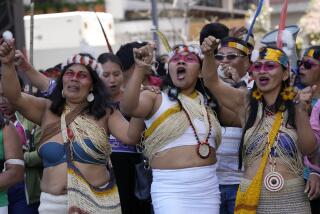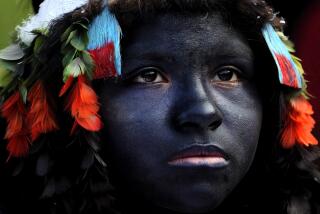Oil and Native Culture Find a Way to Mix in Ecuador
- Share via
COCA, Ecuador — After fighting off outsiders for centuries, Waorani natives have set aside their spears and arrows to welcome a U.S. petroleum company into their remote rain-forest homeland.
The company, Texas-based Maxus Energy Corp., keeps the peace with the Waoranis by sponsoring community development projects, such as a school, and paying native men to help protect the natural environment along a new road into the forest.
“They work monitoring the trees, the animals, the fish, so that the road won’t cause damage,” said Toca Kaiga, a Waorani leader. Maxus employs rotating groups of 36 Waorani who receive about $260 a person for each 22-day work stint--an attractive wage in Ecuador.
Kaiga, 22, and a crew of the workers were spending a few days here at a rustic guest house, provided by Maxus, before going out to work. Asked how well the company was preserving the environment, Kaiga responded quickly in his broken Spanish, “Correctly Maxus is working, without damage.”
Such assurances do not satisfy critics. Peter Oxford, a nature photographer and tour guide, said the Waoranis--who number an estimated 1,200 and still hunt with spears and arrows--fail to understand that the road will carry in outside influences that eventually will destroy their traditional culture, even if the forest is preserved.
“They don’t see into the future,” Oxford said. “They see the school being built, and they like it. They don’t realize they’ve sold their soul.”
In May, Maxus began developing its concession in Block 16, an area divided by the Yasuni River southeast of Coca. Up to 100 production wells will be drilled in the block, which has an estimated 220 million barrels of recoverable heavy oil, according to William C. Hutton, general manager of Maxus Ecuador. Hutton calls it the “largest heavy-oil development project in the world.”
The gravel road Maxus is building runs 85 miles through Block 16. Some Indian advocates fear the road will open up areas south and east of Coca for petroleum exploitation--including Block 17, where Brazil’s Petrobras abandoned exploration in 1987 after a particularly fierce Waorani group killed Roman Catholic missionaries who were trying to prevent violent confrontations with oil workers.
Hutton said Maxus has hired a subsidiary of the Missouri Botanical Garden to inventory plants cut from the road’s 80-foot right-of-way and to operate a nursery of native species for reforestation.
Fewer than 1,000 acres will be deforested, he said. The environmental and social costs of the project will be “at least 5% to 10%” of its total budget, he said.
More to Read
Sign up for Essential California
The most important California stories and recommendations in your inbox every morning.
You may occasionally receive promotional content from the Los Angeles Times.













